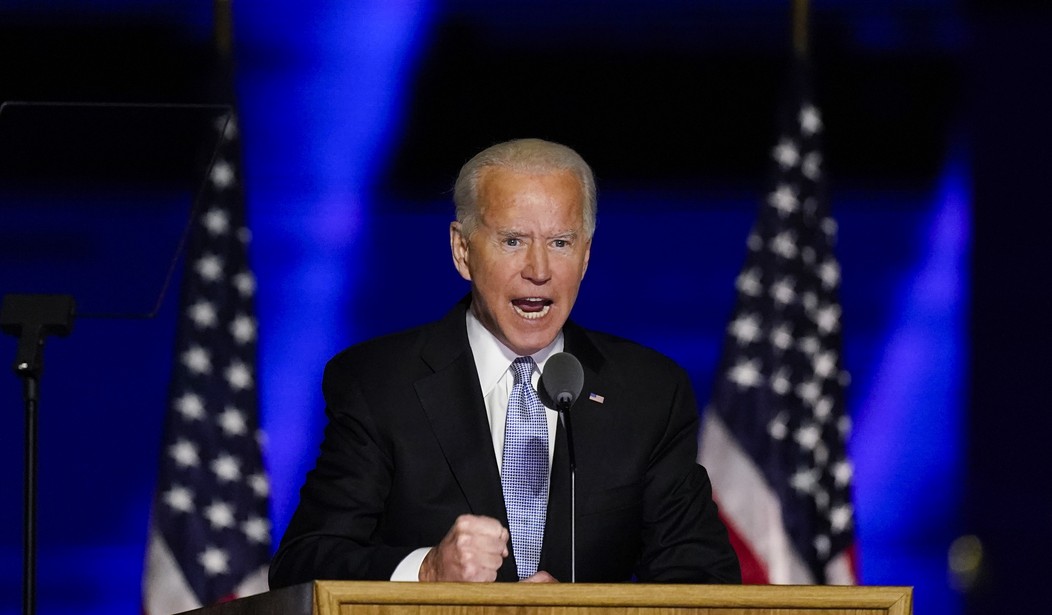If anything can pull Joe Biden out of his basement, it’s the prospect of speaking at a union rally. If elected president – the verdict is not in yet – he is certain to promote federal legislation, the Protecting the Right to Organize (PRO) Act, that would give organized labor almost everything it wants. And what it wants most of all is to force unionization upon reluctant employers and employees.
The former vice president and Delaware senator isn’t shy about where he stands. “I make no apologies,” he said during his campaign kickoff speech in Pittsburgh on April 29, 2019. “I am a union man. Period.”
Labor officials are happy to have the former vice president aboard. And they are positively over the moon about his becoming president. AFL-CIO President Richard Trumka, whose federation represents 12.5 million workers in 56 affiliated unions, issued this November 7 statement:
"Democracy is prevailing. Joe Biden and Kamala Harris’ victory in this free and fair election is a win for America’s labor movement. Everywhere in every way, working people are heroically and resiliently fighting back against this pandemic, its economic fallout, chronic income inequality and systemic racism. President-elect Biden and Vice President-elect Harris saw us, heard us and campaigned on a promise that we, as one nation, will build back even better than before…Let’s be clear: Union voters delivered this election for Biden and Harris."
Other union officials are celebrating. “Working people now have someone in the White House who will strive to protect America’s working families, not just the wealthy and the powerful,” said Office and Professional Employees International Union President Richard Lanigan. International Brotherhood of Electrical Workers President Lonnie Stephenson remarked, “This is not just a victory for the Biden/Harris ticket, but a win for all working people.”
Recommended
Much of the reason for the excitement is the distinct possibility of the PRO Act becoming law. The measure, introduced in May 2019 by Rep. Bobby Scott, D-Va., and Sen. Patty Murray, D-Wash., would dismantle virtually every existing safeguard against union monopoly in the private-sector workplace. The House of Representatives, predictably, passed the measure (H.R. 2474) this February by a 224-194 margin. The Senate thankfully has stalled.
Let us understand something. The Protecting the Right to Organize Act is not about protecting anyone’s right to organize or join a union. The National Labor Relations Act has guarded that right for 85 years. The PRO Act is about expanding union membership, dues collections, bargaining power and political influence. Employers and employees who object would have little or no recourse. If the proposal becomes law, nonunion employers could be drawn into needless, costly and time-consuming legal battles.
Among other things, this legislation would:
Repeal all state Right to Work laws. Currently, 27 states have laws that protect private-sector employees from being fired for not paying dues to a union with an active collective bargaining agreement. The PRO Act would override these laws, nullifying Section 14(b) of the Taft-Hartley Act of 1947. Unions always have opposed Right to Work laws.
Mandate employer recognition of a union as a bargaining agent if a simple majority of employees sign membership pledge cards. Card check campaigns involve high-pressure tactics on the part of union organizers to induce workers to sign cards indicating an intent to join. Unions prefer this to secret ballot elections, which carry the possibility of defeat. The PRO Act would force employers to recognize a union as a bargaining agent following a successful card check. It also would require them to hand over employee addresses, email addresses, phone numbers, work schedules and other private information to organizers.
Authorize the NLRB to intervene on behalf of a union in an election dispute. The PRO Act stipulates that if a union loses a secret ballot election, the National Labor Relations Board can claim “employer interference” for virtually any reason it deems fit. The board could nullify an anti-unionization vote, cite the results of a prior card check, and declare the workplace unionized. The burden of proving noninterference entirely would rest on the employer.
Want more? The PRO Act would: force companies to bargain alongside contractors or franchisees even if the former has no control over wages, benefits, scheduling and other workplace standards; ban the use of employment arbitration clauses; authorize “secondary boycotts” by unions against companies maintaining a business relationship with the primary target company; and restore the Obama-era Labor Department “persuader rule” forcing employers to reveal the nature of outside legal advice.
Joe Biden wholeheartedly supports the PRO Act. His website claims that employers and their political supporters (especially Donald Trump) have been waging “a war on organizing, collective bargaining, unions, and workers.”
It’s fitting that Sen. Bernie Sanders, I-Vt., is expressing interest in becoming labor secretary. Sanders and Rep. Marc Pocan, D-Wisc., back in October 2015 sponsored a predecessor to the PRO Act called the Workplace Democracy Act. (Hint: It wasn’t about democracy.) In a Biden administration, the Department of Labor might as well change its name to the Department of Organized Labor.
Carl F. Horowitz is senior fellow at National Legal and Policy Center, a Falls Church, Va.-based nonprofit organization dedicated to promoting ethics and accountability in American public life.
























Join the conversation as a VIP Member